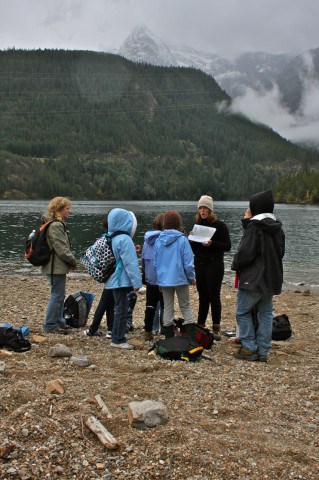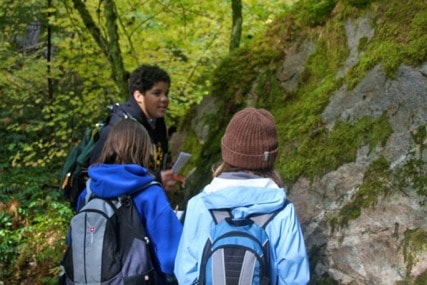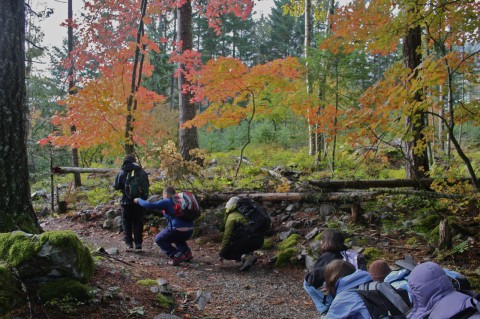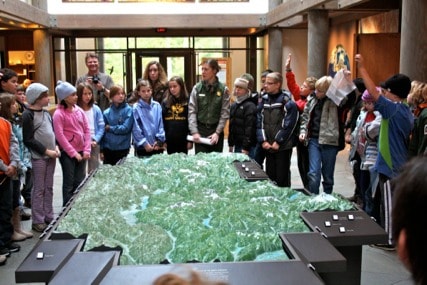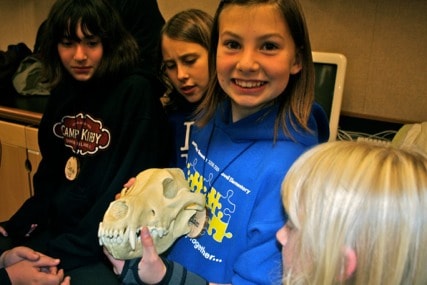This place, through their eyes
You can feel them approaching. It is a surge of energy, a tidal wave of enthusiasm and wonder, about to overtake this place. The momentary quiet of the North Cascades Environmental Learning Center awaits eagerly the arrival of giggles and shouts, of singing and learning once more. Standing in the parking lot on a Monday or Wednesday afternoon, we, as instructors, can anticipate only so much. Backpacks are stuffed to the brim with daily supplies and previous nights are spent late, preparing for the next day’s activities.
It isn’t about us, though. As students arrive, whether by bus or by car, with gaping grins of glee and eyes wide with wonder, every time a Mountain School tidal wave hits, we are reminded—it is about these students and this place.

Students learn about glaciers & watersheds along the shores of Lake Diablo, Photo by Ken Harrison
As the fall season of Mountain School comes to a close and the Learning Center wraps itself up in its wintry blanket, I realize I am nostalgic for more campfires, craving a chance to teach just one more day outside. As the days are getting shorter and the nights colder, all I want to do is sing the Moose Song and examine animal signs along Sourdough Creek trail. But alas, as the Newhalem Visitor Center slideshow exclaims—“Change is the only constant!â€
With Mountain School, change is happening here. Constantly. Positive change. The forging of students’ connections to nature, the changing of relationships and of place.
Each One Teach One is a favorite activity, where students become the teachers, Photo by Ken Harrison
Looking back on the fall season of Mountain School, nearly 650 students, along with a plethora of supportive teachers and parent volunteers, were able to share and explore this inspiring place. They came from all over the Pacific Northwest region—traveling from Bellevue and Whidbey Island, from Bellingham and Seattle—with the hope of expanding their minds and discovering what their backyards, their National Park can reveal.
Students discuss habitat suitability for carnivores in Field Science & Leadership, Photo by Kelsi Franzen
Field tools, like this tape measure & twine, are used to assess habitat suitability, Photo by Kelsi Franzen
Mountain School’s two curricula, the Ecosystem Explorations and Field Science and Leadership: Carnivore Curriculum, set a strong foundation for the experience. Students, teachers, and parent volunteers connect to the natural, cultural, and geological history of this region, while field science techniques and sensory awareness activities engage students in reading and exploring the landscape.
Traveling like different types of wildlife on the trails is both fun and insightful, Photo by Ken Harrison
Rangers Katie, Mike & Autumn from North Cascades National Park teach students, Photo by Ken Harrison
These students have inspired me, as both a teacher and a person passionate about this place. I am reminded to play, to be joyful, to be curious. I know this place better because of my Mountain School students.
Campfire & cultural skit night, Ecosystem Explorations, is a highlight for students, Photo by Kelsi Franzen
Students from Catharine Blaine in Seattle pose for a scenic photo with Lake Diablo, Photo by Kelsi Franzen
Exploring North Cascades National Park mammal skulls at a Ranger Program, Photo by Ken Harrison
But oh to be able to see this world through their eyes. To be filled with that sense of wonder, that overwhelming joy this place offers as is reflected in my students’ contagious energy, their smiles. To be a kid again. I will not forget their probing questions and surprising insights, the laughs we shared and the trails we traveled. I will not forget their thank you notes, so thoughtfully written.
“Thank you so much for teaching us about our earth†reads a student’s thank you note. Another reads, “I was lucky to meet you.”
I thank you, Mountain School. I am lucky to have met you, known you, Mountain Schoolers. These moments, these experiences are a gift. You are a gift to this place.


